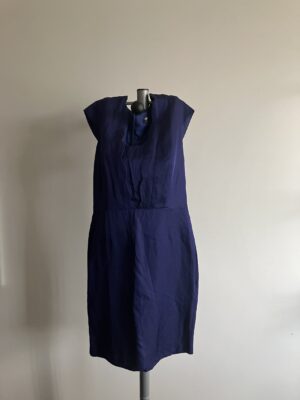In this episode, I talk to the poet Elizabeth Holloway about how Sharon Olds’ poem ‘The Blue Dress’ influenced the writing of her own poem ‘Blue Dress’.
Liz talks about the impact Sharon Olds had on her when her first British collection – The Sign of Saturn – was published (in 1991). She talks about the idea of confessional poetry, and how closely we can connect the author with the narrator of the poem. She talks about Sharon Olds’ own version of free verse and how technically skilful she is in terms how she uses uses run-on lines and punctuation to carry the narrative along. Liz also reflects on the different versions of Olds’ persona that are represented in the poem. She talks about the idea of ‘safety’ and disguise in this work, and goes on to discuss the figure of Electra in relation to Olds’ poem too.
Liz talks about how aware she was of Olds’ poem when she was writing her own piece ‘Blue Dress’. She describes the free verse form she has taken on, then explores the similarities and differences between her poem and Olds’ piece. Liz talks about the use of blue in other mother-daughter relationships she has written about, then considers the tone of the poem – how both doubt and anxiety play a big part in the making of this work. She goes on to examine the ‘prosy’ quality of her poetry and where she allows herself to tune into more heightened language. She talks about touch and feel, and getting back in touch with someone special who has been missing from the narrator’s own life in the context of Falling Mother.
Dr Elizabeth Holloway (formerly Elizabeth Barrett) is an award-winning poet whose work has been published extensively in journals and anthologies. She is the author of four full-length collections of poetry. Her first book Walking on Tiptoe (Staple, 1998) focuses, in part, on the diagnosis of her son as autistic. Elizabeth received an Arts Council of England New Writers’ award to support the completion of her follow-up collection, The Bat Detector (Wrecking Ball Press, 2005), which continues to explore the experience of parenting an autistic child. In the collection, Elizabeth uses the metaphor of detecting bats to understand the process of communicating with a non-verbal child. The collection led to a collaboration with the violist Robin Ireland who composed original music for a sequence of the poems. Subsequent collections include Walking on Tiptoe and Other Poems (Bluechrome Press, 2007) and A Dart of Green and Blue (Arc Publications, 2010). In 2018, Elizabeth received a Northern Writers award to support work on her future collection, Falling Mother.
Liz Holloway read Sharon Old’s poem ‘The Blue Dress’ from her collection The Sign of Saturn: Poems 1980 – 1987 (Secker and Warburg, 1991) . A version of the poem can be read here: https://www.wisdomportal.com/PoetryAnthology/SharonOlds-Anthology.html.
Blue Dress
The call comes out of the blue.
How else? There is only the blue.
It is what we have lived with.
Afterwards, I am dazed by the day.
I replay the phone ringing twice —
the way I picked up the second time
remembering she used to do this.
“It’s alright Mum, it’s me calling”.
She names a date and place,
the hours she could be there.
She knows it might sound crazy.
Too far away. Afterwards, I wonder
if she heard the hesitation in my voice.
I want to get something for her.
Perhaps because I don’t believe
I am enough. Maybe to make up
for birthdays I’ve missed. Or just
to have something, whether true
or a lie. Something she can’t deny
is a gift from her mother. Something
she can hide from her father if he asks.
I would need to pick out something
not too expensive she could say
she bought for herself. Something
un-extraordinary. A plain gift giving
nothing away. Something to wear perhaps.
I choose Oasis, the airy boutique
with a glass lobby and mirrory gallery
at the top of a silver river of stairs.
Thin men in hoodies and tall girls
with eyeliner and ponytails
peer over a chrome rail.
I flatten myself against the side
like a nun, try to be invisible.
I braved this place for her.
Beyond the lobby, random rails
of fluid clothes. Denim. Sweats.
Coats with fur-edged hoods.
I don’t know who she’s become.
It’s foolish. Impossible. As I turn
to go, a rack of spare clothes —
one-offs, small sizes, shop returns —
and suddenly a bolt of blue in my eye
like shot silk from Shandong.
I run it through my fingers.
The grain catches. I trace
the scalloped neck to the waist,
test the lay of its deep V over
an inset panel, across the breasts.
I push my hands inside, try to gauge
the space for her ribs. In the LED light
it turns purple indigo delphinium iris.
